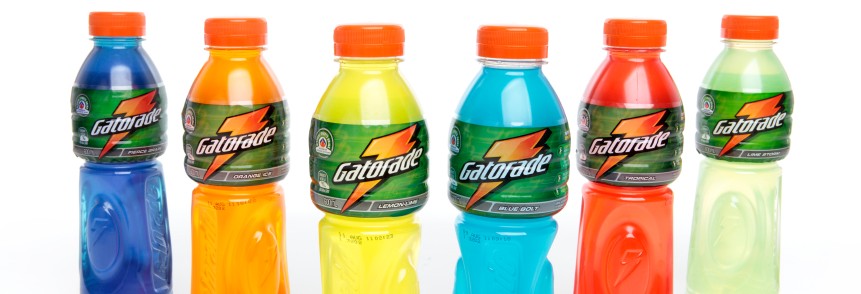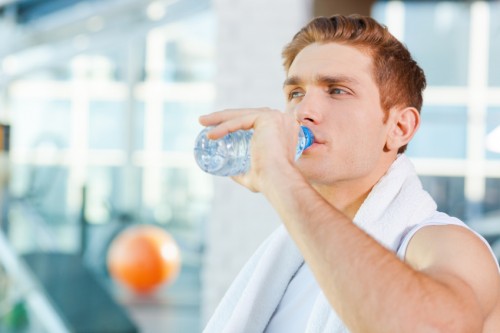
Do you want to be a great athlete? If you do, you should drink Gatorade, according to commercials featuring professional athletes. In recent years, Peyton Manning, Tiger Woods, Dwyane Wade, Sidney Crosby, and Derek Jeter have all endorsed Gatorade.
Of course, the ads for Gatorade are pure hype. If you had the energy to exercise several hours more than Manning every day, you could never perform like him. But could you perform better in sports than you are now if you drank Gatorade or any other sports drink? In other words, are sports drinks good for you?
Are Sports Drinks Good For You?
 First, let’s take a look at what sports drinks are — and what they are aspiring to achieve. Sports drinks are supposed to be consumed by people during and after their exercise. While you are exercising your body:
First, let’s take a look at what sports drinks are — and what they are aspiring to achieve. Sports drinks are supposed to be consumed by people during and after their exercise. While you are exercising your body:
- Loses water.
- Burns calories that are needed to provide energy for post-exercise activities.
- Loses minerals. The lost minerals include calcium, chloride, magnesium, potassium, and sodium.
Exercising can make you dehydrated. Generally, you become more dehydrated when you exercise intensely and sweat profusely. Sports drinks are designed to rehydrate you so you can recover from your exercise. People who recover better from an exercise can function better for the rest of the day. They’re also better prepared for exercises in the near future. People exercising intensely later in the day or the next day need to be rehydrated more than other people.
Water also helps people rehydrate. Sports drinks, though, contain carbohydrates that can be converted into energy as well as the minerals you lost during the exercise. Gatorade dominates the sports drinks market with a 75 percent market share. Other sports drinks include 100plus, Accelerade, All Sport, Coconut water, Herbalife H3O Pro, Hydralyte Sports, Isostar, Lucozade Sport, Powerade, Revive, Sqwincher, Staminade, and Vemma Thirst.
The effectiveness of sports drinks has been analyzed many times by many scientists. There isn’t a precise consensus. However, most researchers believe that sports drinks are only effective for people who exercise very intensely for much longer than most people. You are exercising intensely when your heart rate is 70 to 90 percent of your maximum heart rate — 220 beats per minute minus your age. If you are 30 years old, you are exercising intensely when your heart rate is 133 to 171 beats per minute.
Below are some points made by people who have studied sports drinks. Some of the viewpoints differ from others.
- The American College of Sports Medicine reports that there is “little evidence” that the athletic performance of people who exercise for fewer than 60 minutes and drink sports drinks is better than the performance of people who exercise for fewer than 60 minutes and drink water, according to the WebMD article “What to Drink When You Exercise.”
- Kristine Clark, Penn State University’s director of sports nutrition, told WebMD that people who exercise 90 minutes in a cool environment are better off drinking water than a sports drink. In other words, people exercising in humidity are more in need of sports drinks. That’s because humidity causes a loss of minerals in the body such as sodium.
- People who are exercising for more than an hour at “medium to high intensity” should consider a sports drink with 13 to 19 grams of carbohydrates in an eight-ounce serving and 80 to 110 milligrams of sodium. That’s what Andrea Chernus told the magazine Men’s Fitness in an article entitled “Sports Drinks Vs Water.”
- People who ate fast food after they intensely exercised performed just as well two hours later when they rode an exercise bike as people who consumed sports drinks after they exercised. This study indicates that the amount of calories consumed was more important in recovery than the specifics of the food and beverages consumed. The research was published in this article entitled “Sports Drinks Vs Water.”
- Nutritionists say that sports drinks should not be “routinely” given to children, according to “Study: Sports Drink Science Is Self-Serving.”
- “Most nationally known nutritionists” think sports drinks are harmful because they have a lot of sugar, according to the same article.
The bottom line is that most people who exercise are better off with water than sports drinks. Professional athletes benefit from sports drinks due to the high intensity training programs they regularly put their bodies through. But for the rest of us, water will do just fine.
[hs_action id=”1378″]

2 thoughts on “Are Sports Drinks Good For You?”
Comments are closed.